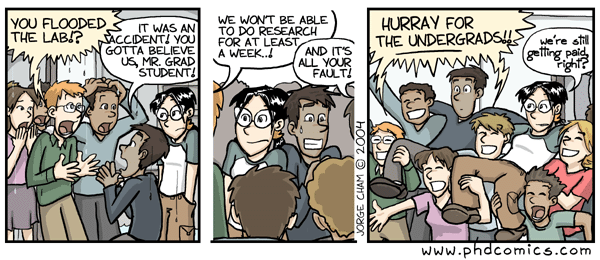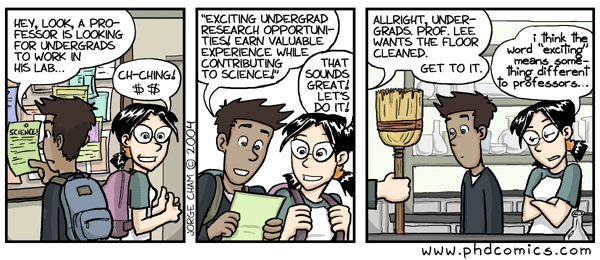What is the role of students in universities? There are ongoing contentious debates and campus protests about whether graduate students should be considered employees with the right to unionize. Likewise, the employment status of student athletes receives intense discussion from the media and scholars. These questions concern whether universities should acknowledge students as contributors and not just consumers for the institutions’ missions of research and education.
Another unrecognized group of student labor is undergraduates who work in research groups. These students rarely see themselves as exploited or even as contributors to research or knowledge, a view typically shared by the faculty and graduate students who work with them. After all, including undergraduates in a research community is typically considered a service to the undergraduates, not to the research community. The NSF’s influential Research Experience for Undergraduates program calls their paid positions “an educational opportunity,” rather than a form of research or labor. And it is true that undergraduates learn crucial sociotechnical skills by participating in a research group, aligning with the theory of situated learning in a community of practice.

Assumptions about how undergraduates contribute to research labs, PhD Comics
However, it is not just the undergraduates who learn from their work in research groups. Undergraduates also play crucial roles in a group’s construction of knowledge, practices, and shared identity. Specifically, unique perspectives and interactions emerge from undergraduates’ achieved and ascribed identity as low-status, low-stakes, broadly educated learners without a commitment to a specific body of knowledge. This insight emerged from my participant observation and interviews in four engineering research laboratories in a medium-sized public research university in the United States (more info here).

A stereotype of undergraduates as unskilled, unhelpful labor, PhD Comics
How undergraduates contribute to knowledge
Undergraduates influence knowledge construction by asking questions that would not occur to an expert or perhaps that a graduate student or professor would not ask for fear of looking stupid or uninformed. For example, in a weekly meeting for a materials science research group, graduate student Alison presented a draft of her dissertation proposal and then she, several graduate students, and their faculty advisor Kate debated how to word the project’s hypothesis. After they had rephrased the hypothesis, undergraduate Gretchen stumped them all by asking a seemingly simple question: how will that hypothesis be tested? Alison thought quietly for several seconds and then admitted that she didn’t know by responding, “Good question.” She looked at her peers for help, but they looked back at her blankly. Finally, Kate ended the silence and legitimated the undergraduate’s question by agreeing: “Yeah, I don’t know either.” Everyone laughed, thereby defusing any tension and embracing the undergraduate as a valuable contributor to how they think about research. They then discussed how to address Gretchen’s question in Alison’s proposal. Gretchen seemed surprised and a little embarrassed by this reception of her question, which she had asked to clarify her own understanding rather than to suggest criticism of Alison’s presentation.
Undergraduates’ inexpertise in a research community’s field, alongside their low hierarchical status and others’ low expectations of their knowledge, empowers them to ask questions that may seem basic but that actually cut to the foundations of a community’s research practices and assumptions about knowledge production. Etienne Wenger frames this valuable ability of outsiders to see beyond the somewhat homogeneous perspective of a community of practice as “a wisdom of peripherality” (p. 216). (We ethnographers, particularly those of us who practice engaged, participatory, and/or interventionist research methods, also hope to contribute the wisdom of outsiders to the communities we study!)
How undergraduates influence research practices
This outsider status also allows undergraduates to propose new ideas without risking damage to their reputation. Their broad education can yield new, valuable inputs for graduate students and faculty, who have narrower training and usually a longer timespan since their own broad education. Undergraduates serve as embodied trading zones, in that they carry knowledge from various fields into a research community (as well as vice versa).
Edward, a graduate student in electrical engineering, credits undergraduates’ attention to the media for their innovative ideas:
[Undergraduates] Will and Rick know stuff that are more on the tech news, not on the textbooks … So they have better ideas … For example, me, I start thinking from, like, textbook style, “Is it possible to do?” But they say, “Yeah, it has been done, maybe not feasible in some cases,” based on a [specific] project’s perspective. It’s nice to have those ideas.
Edward rejects the common assumption that undergraduates are mere reservoirs of textbook knowledge and instead admires their ability to suggest cutting-edge approaches for the group’s research. For example, Edward credits Rick for improving how the group built a sensor system: “We would just protect [the sensors] somehow, using some casing. We never thought about 3D printing. But then Rick said, ‘Yeah, we can 3D-print.’” An undergraduate brought the graduate students a novel idea, which they then implemented. This ability to import new ideas and practices may explain the trend noted by Thomas Kuhn that paradigm-shifters tend to be newcomers to a field.
How undergraduates encourage community-building
Undergraduates can serve as social glue for a community because they tend to work with a variety of people and projects, rather than committing to one project as most graduate students do. Also, faculty and graduate students tend to consider undergraduates “fun,” based on the enthusiasm and energy they express about lab work. Similarly, Gary Fine found that amateur mushroom collectors’ enthusiastic interest in mycologists’ research and expertise made the scientists feel encouraged and valued. Undergrads can play this role of the admiring outsider in research groups, by expressing wonder and interest in work that more experienced researchers might dismiss as mundane.
Undergraduate Jessie, for example, was weighing and photographing samples before they were experimented on in Kate’s materials science laboratory. Kate calls this task “grunt work,” and sometimes apologizes to undergraduates for asking them to do it because she finds it so boring. But after an hour of this work, Jessie held up a sample to show me its unusual surface texture. She examined it closely and explained what looked unusual. Her sense of wonder and attention to detail do not match Kate’s perception of sample preparation as monotonous. Kate appreciates this undergraduate trait. She told me, “I forget sometimes [that] I’ve been immersed in this [research] so long. [Undergrads] have helped me because … it’s fun seeing them so excited about stuff and so that excites me too.” Undergraduates’ enthusiasm can remind lab members of their own interest and pleasure in their research, which they may otherwise take for granted. Furthermore, expressing enthusiasm and emotion may seem unprofessional or naïve for a graduate student or professor, but matches typical expectations for undergraduates to behave as young learners who are as yet uncommitted to the profession.
Embracing students as more than learners
I am not calling for unions or employee status for undergraduate researchers. After all, many undergraduates—though not all—are compensated for their contributions to research through pay, course credit, and/or authorship. Ideally, they also gain sociotechnical skills and tacit knowledge that help them succeed in STEM degrees and careers, and establish a professional network that provides crucial social capital (e.g., recommendation letters, career advice, mentoring, resume-boosting experiences).
However, students’ primary status as learners should not preclude recognition of their contributions of labor, ideas, and community-building to research. This recognition should come from their universities and faculty mentors as well as from those of us who study research communities. STS scholars are increasingly and admirably including stakeholder groups beyond scientists and engineers in our studies of knowledge construction. Students are another influential and as yet understudied group. Undergraduates may be unaware of or satisfied with the invisibility of their research work, but we do them a disservice by overlooking the value of their contributions and by misrepresenting the everyday realities of laboratory labor and laborers.
With thanks to Beth Reddy.
References
Fine, G.A. 2003. Morel tales. Urbana and Chicago: University of Illinois Press.
Kuhn, T.S. 1996. The structure of scientific revolutions. Chicago: University of Chicago Press.
Lave, J., and E. Wenger. 1991. Situated learning. Cambridge: Cambridge University Press.
Galison, P. 1997. Image and logic. Chicago: University of Chicago Press.
Wenger, E. 1998. Communities of practice. Cambridge: Cambridge University Press.
Wylie, C.D. 2018. “‘I just love research’: Beliefs about what makes researchers successful. Social Epistemology 32 (4): 262–71.
Wylie, C.D., Kim, F., Linville, I., and A. Campo. 2019. “Graduate/undergraduate partnerships (GradUP): How graduate and undergraduate students learn research skills together.” In Proceedings of the American Society for Engineering Education. Tampa.
Wylie, C.D. (accepted). The epistemic importance of novices: How undergraduate students contribute to engineering laboratory communities. Sociology of the Sciences Yearbook.
Wylie, C.D. (accepted). Socialization through stories of disaster in engineering laboratories. Social Studies of Science.
Zema, P. 2019. “Should student-athletes be paid?” Sport, Ethics and Philosophy 13(2): 198-212.
